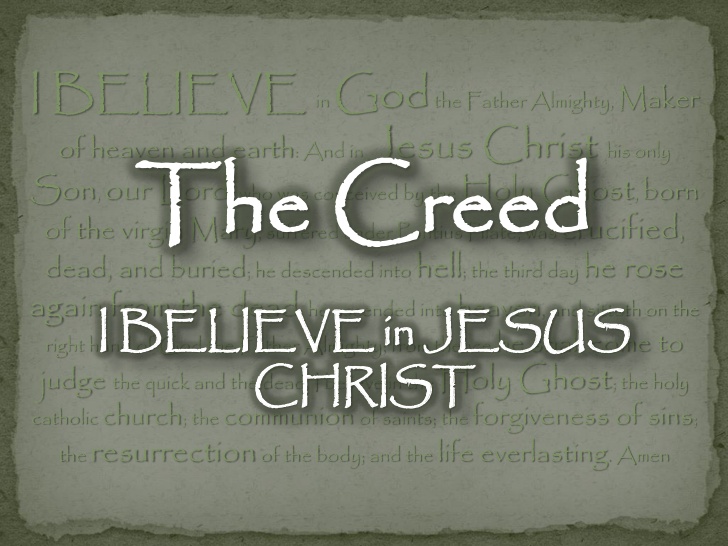There was talk before and there will be talk again that Christians need deeds and not Creeds. There are churches that think that our creeds are kind of information but not something that needs to be subscribed to. Lutheran”s used to subscribe to the Creeds and confessions of the church. Their are such things as confirmation vows that promise to be true to the church that confesses stuff, including the Creeds. There are those that teach that Jesus had no Creeds. I found an article by an old time professor named J.T. Mueller written almost 100 years ago. It is a stunning list of what Jesus “requires”. We can do nothing to gain our own salvation, but because that salvation has been achieved there are certain things that the love of Christ “compels” us to do. Here is Mueller –
The Creed of Jesus. – The creed of Jesus involved, in the , first place, His own person. In clear terms He acknowledges His deity. He is God’s Son, John 3, l16. 17; the Christ, the Son of the living God, John 6, 69. He is one with the Father, John 10, 30, in one undivided and indivisible essence. He commands His disciples to baptize all nations in the name of the Father and of the Son and of the Holy Ghost. Matt. 28, 19. For Himself He demands acknowledgment of His deity and divine worship in the same sense as it is due to the Father. John 5, 23. This He requires because He is the living God in the same sense as the Father. John 5, 26. But Jesus acknowledges also the Holy Spirit as the one true God with the Father and Himself. Matt. 12, 31; :for He is the Spirit of God, John 6, 63, who proceeds from the Father, John 14,26, as well as from the Son John 15, 26; 16, 7. ‘ . Since Christ is one with the Father and the Holy Ghost, He claims for Himself not only unity of
essence with the Father, but also unity of divine operation. John 5, 17. As the divine Christ, one with the Father and the Holy Ghost, of the same glory and majesty, Christ demands acceptance, worship, and homage of Himself and His Word. John 5, 23. 36. 37. He sharply rebukes those who <lo not accept His witness. John 5, 38. ‘Those who do not accept this witness cannot have God for their Father. John 8,
42. really are of the devil, whose lusts they would do. John 8, 4’1. On the other hand, God’s children hear God’s Word, John 8, ,17, and search the Scriptures to find Christ, John 5, 39. Thus we see that Christ had a very distinct creed concerning the true God, His own deity, and His divine message. He proclaimed in terms that admit of no doubt the worship of the Holy Trinity, faith in Him as the divine Savior, and acceptance of His Gospel as necessary for salvation. Only those who accept His Word have life. Mark 16, 15. 16. That men, despite this clear ·
testimony of Christ claim that the great Master taught no theology is a proof£ of the dreadful perversion and apostasy of the present generation. John 8, 4’1; Matt. 24, 22-24.
However, Christ’s creed also embraces the reality of sin and the plan of salvation from sin. To Christ the existence of a per-sonal devil was an incontestable reality. John 8, 44. Satan and the perverted will of men are responsible for the woespiritual oppression under which man is held. Luke 8, 12. Born in sin and fettered by it, man cannot see the kingdom of God except he be born again of water and of the
Spirit, John 3, 3-5; for that which is born of the flesh is flesh, v. 6. · This new birth, the work of the Holy Spirit, consists in repentance and faith. Mark 1, 15. Only those who repent and believe on Him can worship God in Spirit and in truth. John 4, 24. 42. He, Christ, alone is the Way, the truth, and the Life, so that no one can come unto the Father but by Him. John H, 6. Faith in the Son is required. John 6, 40. Only to the believer in Christ are given the unqualified promises of salvation. John 5, 24. ‘Thus Christ clearly taught the universality and
damnableness of sin and the necessity of faith in Him, the divine Redeemer, as the only way of salvation. Those who deny this and teach salvation by “deeds” reject the very essence of Christ’s Gospel.


